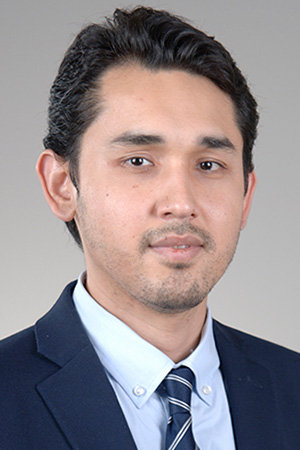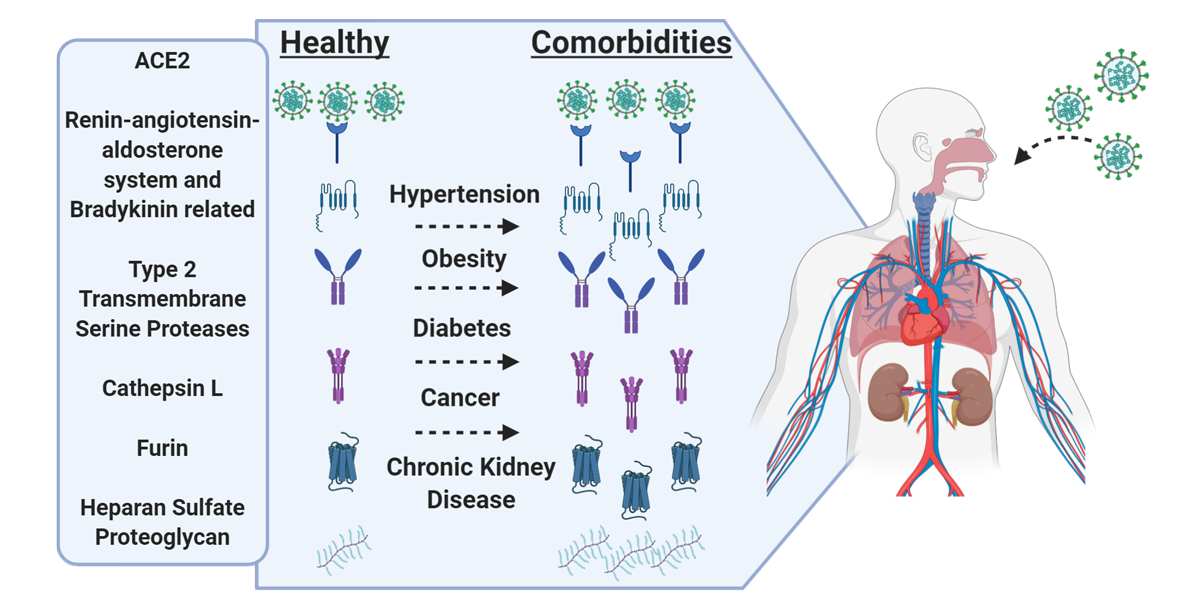Archive: COVID-19 Research and Publications
Prone Positioning Improves Survival in Hospitalized COVID-19 Patients, UToledo Study Confirms
 Placing hospitalized COVID-19 patients who are on oxygen in a facedown position significantly
improves their chance of survival, a large-scale review has found.
Placing hospitalized COVID-19 patients who are on oxygen in a facedown position significantly
improves their chance of survival, a large-scale review has found.
The study of non-intubated patients, published in the peer-reviewed journal Respiratory Care, provides important validation of a practice that has become widespread in COVID units as a way to improve oxygen uptake and clinical outcomes.
“Prone positioning is a noninvasive way of trying to improve patients’ oxygen levels while reducing the need for high-concentration oxygen therapy,” said Dr. Azizullah Beran, an internal medicine resident at The University of Toledo College of Medicine and Life Sciences and lead author of the paper. “Many hospitals are encouraging their patients to do it, but its impact on non-intubated patients has not been deeply evaluated.”
UToledo Scientists Studying COVID-19 Vaccine Response in Organ Recipients
 When healthy people get vaccinated against COVID-19, they can feel confident that
they are well-armored against the virus.
When healthy people get vaccinated against COVID-19, they can feel confident that
they are well-armored against the virus.
For individuals with compromised immune systems, however, it’s not nearly as straightforward.
Studies have shown that some immunosuppressed patients develop a robust antibody response. Others develop no response at all.
“That variation in immune response is one of the biggest questions we are facing,” said Dr. Stanislaw Stepkowski, a transplant immunologist and professor in The University of Toledo College of Medicine and Life Sciences. “It’s the same vaccine, the same dose, but it’s not protecting everyone at the same level.”
UToledo research finds COVID-19 can affect heart’s electrical system
Dr. Khalid Changal, a cardiology fellow in the Department of Medicine, was recently published in the
journal BMC Cardiovascular Disorders. Dr. Changal led a study that suggests COVID-19 can interfere with the complex electrical
system that keeps the heart beating at regular intervals, furthering our understanding
of how the virus can affect some patients' heart and cardiovascular function.
"We know that COVID-19 causes inflammation of the heart and we know patients who have
heart disease experience worse outcomes with COVID," he told UToledo News. "Our study suggests COVID affects not only the heart muscle but the electrical system
of the heart as well. This is something new."
Other authors of the article include: David Paternite, Sean Mack, Spiro Veria, Mitra Patel, Ronak Soni, Muhammad Ali, Mujeeb
Sheikh and P. Kasi Ramanathan.
Sharing Knowledge
Dr. Jason Huntley, professor in the Department of Medical Microbiology and Immunology, explains in this UToledo video the importance of completing both doses of available COVID-19 vaccines.
Dr. Jennifer Hanrahan, professor in the Dept. of Medicine and chief of the division of infectious diseases, discussed the potential side effects of a new COVID-19 treatment in Rolling Stone. Dr. Hanrahan also gave an update on what we’ve learned about the COVID-19 pandemic in this UToledo video.
Dr. Victoria Kelly, assistant professor in the Department of Psychiatry and director of the General Psychiatry Residency program, discusses how to prepare for tough topics at Thanksgiving dinner.
Dr. Vithal Shendge, assistant professor in the Department of Orthopaedic Surgery, wrote an article in
the Sturgis Journal, titled "Impact of COVID-19 on musculoskeletal care."
Members of the Department of Neurology and the ProMedica Neurosciences Center recently
wrote a guide in Frontiers in Neurology, titled "Interventional Stroke Care in the Era of COVID-19." Authors include Drs. Hisham Salahuddin, Alicia C. Castonguay, Syed F. Zaidi, Richard Burgess and Mouhammad A. Jumaa.
Additional research from members of the Department of Neurology, along with colleagues
at 11 stroke centers in Michigan, revealed fewer people were admitted to stroke centers
in Michigan and northwest Ohio since the beginning of the pandemic. Even fewer patients
received the life-saving procedure, mechanical thrombectomy, for the most severe form
of ischemic stroke. Researchers call this negative influence the bystander effect. Authors include Dr. Jumaa, along with Drs. Zaidi and Burgess. The letter, titled "The Bystander Effect on Stroke Care in Michigan," was published in Neurosurgery.
July 20, 2021: UToledo hosts Sixth COVID-19 Virtual Town Hall
In our virtual town hall series, experts share recent findings about how COVID-19 and its vaccines affect cardiovascular health.
Toledo Mayor Wade Kapszukiewicz and Dr. Matthew Hepburn explore the impact and outlook for the virus in northwest Ohio and nationally. Panelists field questions from community members in attendance.
Panelists
- Christopher J. Cooper, M.D. Dean, The University of Toledo College of Medicine and Life Sciences
- Joan Duggan, M.D. Professor, Department of Medicine, Infectious Disease
- Matthew Hepburn, M.D. Defense Advanced Research Projects Agency, Biological Technologies Office
- Jason F. Huntley, Ph.D. Professor, Medical Microbiology and Immunology
- Wade Kapszukiewicz Mayor, City of Toledo
Research of ‘Love Hormone’ shows it could hold key to treating COVID-19
Dr. Elissar Andari, assistant professor in the Department of Psychiatry, led a recent study that found
that oxytocin may have potential as a targeted treatment for cytokine storms in COVID-19
patients.
Dr. Andari’s research team, which included Ali Imami, a graduate student in our Bioinformatics program, used a National Institutes of
Health database to analyze characteristics of genes treated with drugs closely related
to oxytocin. They found that one drug in particular, carbetocin, has similar characteristics
(called a signature) to genes with reduced expression of the inflammatory markers
that trigger cytokine storm in COVID-19 patients.
"Understanding the mechanisms by which oxytocin or the oxytocin system can be a new
immune target is crucial," the authors concluded in their report, which was published
online recently in the journal Physiological Genomics.
However, Dr. Andari added that "safety and efficacy of intravenous oxytocin in hospitalized
patients with COVID-19 remains to be assessed."
IN THE NEWS: The research was recently shared in U.S. News and World Report and WebMD.
Authors on the publication are Ali S. Imami, Dr. Sinead M. O’Donovan, Justin F. Creeden,
Xiaojun Wu, Hunter Eby, Dr. Cheryl B. McCullumsmith, Kerstin Uvnäs-Moberg, Dr. Robert
E. McCullumsmith, and Dr. Elissar Andari.
Research looks at link with comorbidities
There's a new COVID-19-related publication from our researchers, who examined 1,900+ patients with various comorbidities and show that some of these diseases have the potential to increase the ability of the virus to infect target organs.
The publication was led by a graduate student Joshua Breidenbach, and chosen as the Feature paper in the Journal of Personalized Medicine. The full team included Drs. Prabhat Dube, Ms. Subhanwita Ghosh, Mr. Belal Abdullah, and Drs. David Kennedy, Steven Haller, Nikolai Modyanov, Deepak Malhotra, and Lance Dworkin.

Research links COVID-19 to loss of taste
Nearly half of individuals who contract COVID-19 experience an abnormal or complete
loss of their sense of taste, an analysis led by UToledo chief internal medicine resident, Dr. Muhammad Aziz, has found.
The systematic review, published in the journal Gastroenterology, could provide yet another diagnostic hint for clinicians who suspect their patients
might have the disease.
“Earlier studies didn’t note this symptom, and that was probably because of the severity
of other symptoms like cough, fever and trouble breathing,” said Dr. Muhammad Aziz,
chief internal medicine resident at UToledo and the paper’s lead author. “We were
beginning to note that altered or lost sense of taste were also present, not just
here and there, but in a significant proportion.”
Dr. Aziz also recently published a meta-analysis on COVID-19 with Drs. Rawish Fatima and Ragheb Assaly in the form of a letter to the editor in the Journal of Medical Virology.
Additional Publications
Ali S. Imami, Sinead M. O’Donovan, Justin F. Creeden1, Xiaojun Wu, Hunter Eby, Cheryl B. McCullumsmith, Kerstin Uvnäs-Moberg, Robert E. McCullumsmith, and Elissar Andari. Oxytocin's Anti-inflammatory and Pro-immune functions in COVID-19: A Transcriptomic Signature Based Approach. Physiological Genomics. 2020.
Artificial intelligence and machine learning to fight COVID-19. Alimadadi A, Aryal S, Manandhar I, Munroe PB, Joe B, Cheng X. Physiol Genomics. 2020 Apr 1;52(4):200-202. doi: 10.1152/physiolgenomics.00029.2020. Epub 2020 Mar 27. PMID: 32216577
Harnessing innate immunity to eliminate SARS-CoV-2 and ameliorate COVID-19 disease. Golonka RM, Saha P, Yeoh BS, Chattopadhyay S, Gewirtz AT, Joe B, Vijay-Kumar M. Physiol Genomics. 2020 May 1;52(5):217-221. doi: 10.1152/physiolgenomics.00033.2020. Epub 2020 Apr 10. PMID: 32275178
Gnotobiotic Rats Reveal That Gut Microbiota Regulates Colonic mRNA of Ace2, the Receptor for SARS-CoV-2 Infectivity. Yang T, Chakraborty S, Saha P, Mell B, Cheng X, Yeo JY, Mei X, Zhou G, Mandal J, Golonka R, Yeoh BS, Putluri V, Piyarathna DWB, Putluri N, McCarthy CG, Wenceslau CF, Sreekumar A, Gewirtz AT, Vijay-Kumar M, Joe B. Hypertension. 2020 Jul;76(1):e1-e3. doi: 10.1161/HYPERTENSIONAHA.120.15360. Epub 2020 May 19.PMID: 32426999
What If I Told You the COVID-19 Pandemic Is Not Entirely Bad? Moussa, M. Journal of Graduate Medical Education: 2020; 12(3); 283-283.


